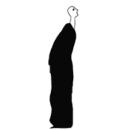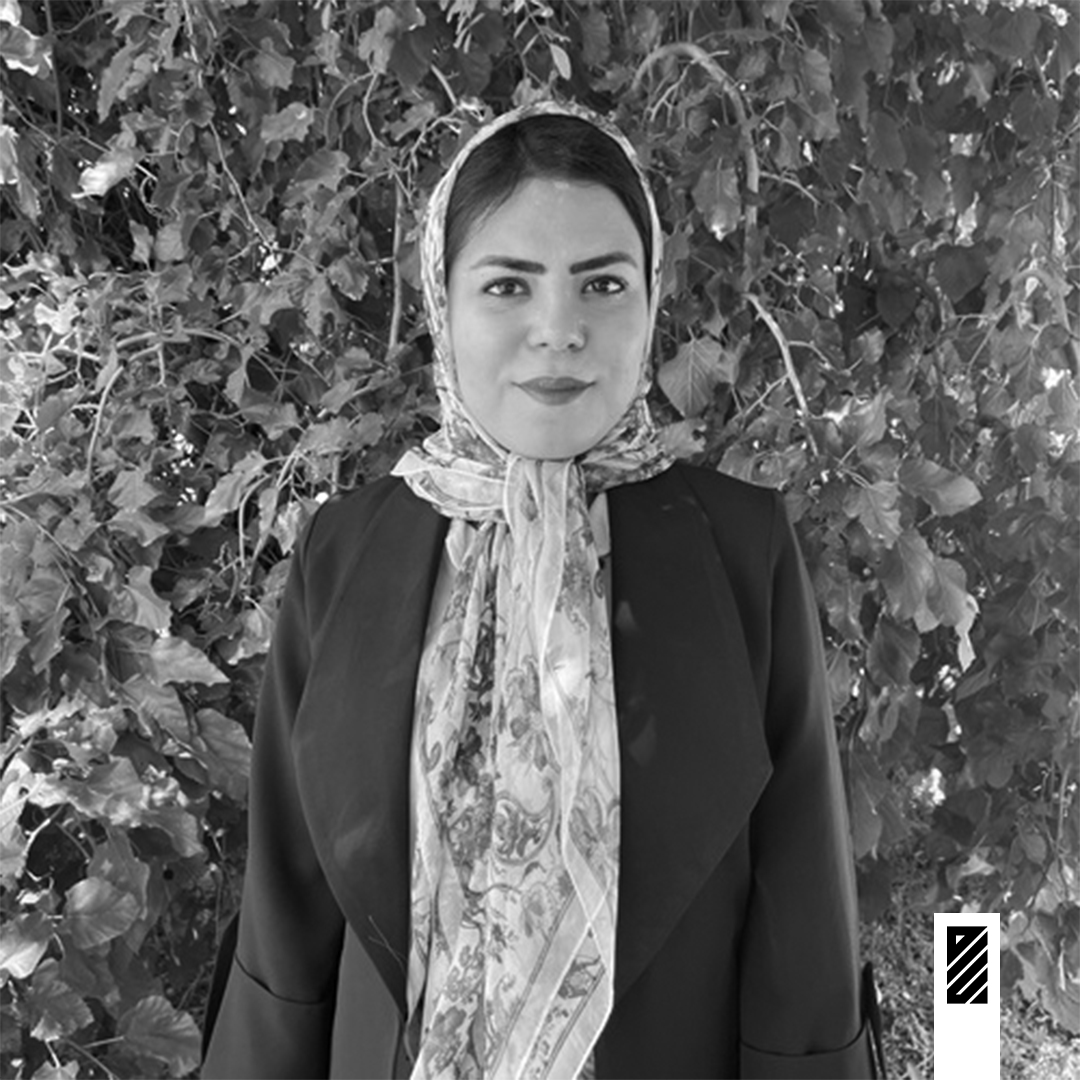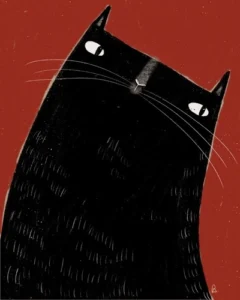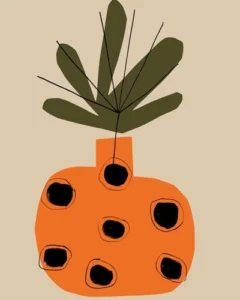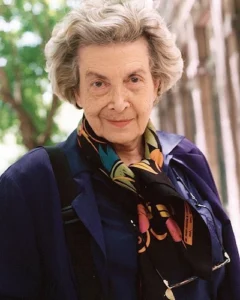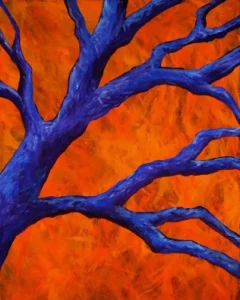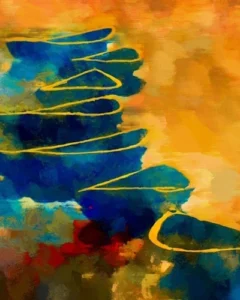درختی که از اورفیوس میگوید | دنیس لورتوف
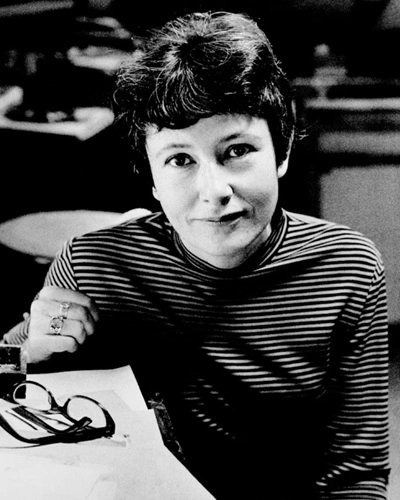
درختی که از اورفیوس میگوید
سپیدهدمی سفید. سکون. هنگامی که موجوارگی آغاز شد،
پنداشتم که نسیمی از دریا آمده است، با شایعههایی از نمک به درهها،
از افقهایی بیدرخت. اما مِه سفید
تکان نخورد؛ برگهای برادرانم همچنان گسترده ماندند،
بیحرکت.
و با اینحال، موجوارگی نزدیکتر شد ــ و سپس
شاخههای دوردستِ من شروع به گزگز کردند، گویی
آتشی در زیر آنها افروخته شده بود، بیش از حد نزدیک، و نوک شاخههایشان
خشک میشدند و به پیچوتاب درمیآمدند.
اما هراسی در دل نداشتم، فقط
هوشیاریای ژرف در وجودم بود.
من نخستین کسی بودم که او را دید، زیرا من
در دامنهی چراگاه رشد کرده بودم، فراتر از جنگل.
گویی او یک انسان بود: دو ساقهی متحرک،
تنهای کوتاه، دو شاخهی بازو، که انعطاف داشتند،
هریک با پنج شاخهی بیبرگ در انتهایشان،
و سری که تاجی از علفهای قهوهای یا طلایی بر آن نشسته،
چهرهای بر خود دارد، نه مانند چهرهی نوکدار یک پرنده،
بلکه بیشتر شبیه یک گل.
او باری را حمل میکرد، ساخته از
شاخهای بریده، خمیده در حالی که هنوز سبز بود،
رشتههای تاکی که سخت کشیده شده بودند. و از این،
وقتی آن را لمس کرد، و از صدای او ــ که برخلاف صدای باد،
نیازی به برگها و شاخههای ما نداشت تا آوایش را کامل کند ــ
موجوارگی پدید آمد.
اما دیگر موجوارگی نبود، (او نزدیک آمده بود و
در نخستین سایهی من ایستاد) بلکه موجی بود که من را دربرگرفت،
گویی باران از زیر و پیرامونم برمیخواست
به جای آنکه فرو ریزد.
و آنچه احساس کردم دیگر گزگز خشک نبود:
گویی من نیز همچون او میخواندم، گویی آنچه
چکاوک میداند، من نیز میدانستم؛ همهی شیرهی وجودم
به سوی خورشیدی بالا میرفت که اکنون
برآمده بود، مه در حال برخاستن بود، علفها
خشک میشدند، اما ریشههایم در ژرفای زمین، موسیقی را حس میکردند
که آنها را نمناک میساخت.
او باز نزدیکتر آمد، بر تنهام تکه زد:
پوستم لرزید، همچون برگی تانخورده
موسیقی! هیچ شاخهای از من نبود
که با شادی و هراس نلرزد.
پس آنگاه که او آواز خواند،
دیگر تنها آواها نبودند که موسیقی میساختند:
او سخن گفت، و من که همچون هیچ درختی نمیشنوم، گوش سپردم، و زبان
به ریشههایم راه یافت،
از دل زمین،
به پوستم آمد،
از میان هوا،
به روزنههای سبزترین شاخههایم خزید،
نرم همچون شبنم،
و نبود واژهای که او خواند، که معنایش را ندانسته باشم.
او از سفرها گفت،
از جایی که خورشید و ماه میروند، آنگاه که ما در تاریکی ایستادهایم،
از سفری زمینی که روزی رویایش را داشت
ژرفتر از ریشهها …
او از رویاهای انسان گفت، از جنگها، از عشقها، از اندوهها،
و من، یک درخت، واژهها را فهمیدم ــ آه، گویی
پوست ستبرم شکافته میشد، چون نهالی که
در بهار بیش از حد رشد کرده باشد و
یخبندان دیرهنگام زخمش زند.
از آتش خواند،
همان که درختان از آن بیم دارند، و من، یک درخت، در شعلههایش شادی کردم.
جوانههای تازه از من شکفتند، گرچه تابستان در اوج بود.
گویی چنگ او (اکنون نامش را میدانستم)
هم یخبندان بود و هم آتش، و آوای آن
تا بلندای تاجم شعلهور شد.
من دوباره بذر بودم.
من سرخس در مرداب بودم.
من زغال بودم.
و در ژرفای چوبِ من
(چنان نزدیک بودم به آن که انسان یا خدا شوم)
سکوتی بود، نوعی بیماری،
چیزی شبیه به آنچه آدمیان ملال مینامند.
چیزی
(شعر پایین میآمد، چون جریانی بر سنگها)
که به شمع، در میانهی سوختناش،
سردی میبخشید، او گفت.
آن هنگام بود،
آنگاه که در آتش قدرتش،
که من را دربرگرفت و دگرگون ساخت،
پنداشتم که باید به تمامی فرو افتم،
زیرا که آوازخون آغاز کرد به ترک من.
آهسته، از سایهی نیمروز من به سوی روشنایی آشکار
گام برداشت،
و واژهها، جستوخیزکنان و رقصکنان، بر شانههایش میپریدند،
باز میآمدند به سوی من
و جریانی رودگونه از نغمههای چنگ،
آهسته،
بار دیگر به موجوارگی بدل شد.
و من، در هراس
اما نه در تردید از آنچه باید کنم،
در اندوه، در شتاب،
ریشه پس از ریشه،
از زمین برکنده،
خاک به تلاطم افتاده و ترک خورده، خزهها از هم گسسته ــ
و پشت سر من، دیگران: برادرانم، فراموش شده از سپیدهدم
در جنگل، آنها نیز شنیده بودند،
و ریشههایشان را، با درد، از لایههایی از برگهای مرده هزار ساله بیرون میکشیدند.
سنگها را به کنار میغلتاندند، خود را از ژرفایشان میشکستند و آزاد میکردند.
گمان میکردی که نوای چنگ را از دست خواهیم داد،
آوای آواز را،
چنان سهمگین بود هیاهوی طوفان،
آنجا که، هیچ طوفانی نبود، هیچ بادی،
جز هجوم شاخههایمان،
تنههایی که سینه سوخته هوا را میشکافتند.
اما موسیقی!
موسیقی به ما رسید.
با دستوپاچلفتی،
بر ریشههای خودمان لغزیدیم،
برگهایمان را به پاسخ،
خشخشکنان،
به رقص درآوردیم.
ما حرکت کردیم، پیروی کردیم.
تمام روز، در فراز و فرودها، پیروی کردیم.
ما رقصیدن را آموختیم،
زیرا او میایستاد، آنجا که زمین هموار بود،
و واژههایی که میگفت، به ما آموخت که بجهیم،
که درهم تنیده شویم و برقصیم،
در نقشهایی که آهنگ چنگ او رقم میزد.
آوازخوان خندید،
تا آنجا که اشک ریخت از دیدن ما، چنان شادمان بود.
در غروب،
به اینجا رسیدیم، جایی که اکنون ایستادهام، این تپه،
با بیشهای کهن که آن روز، تنها چمنی برهنه بود.
در واپسین روشنایی آن روز، آواز او به بدرود بدل شد.
او اشتیاق ما را آرام کرد.
او ریشههای خشکیدهی ما را دوباره به زمین خواند،
آنها را آب داد: باران شبانهی موسیقی، آنچنان خاموش که
نزدیک بود حتی نتوانیم
آن را در تاریکی بیماه
بشنویم.
با سپیدهدم، او رفته بود.
از آن زمان، ما اینجا ایستادهایم،
در زندگی تازهمان.
ما انتظار کشیدهایم.
او بازنمیگردد.
گفتهاند که او سفر زمینیاش را کرد، و آنچه را میجُست،
از دست داد.
گفتهاند که او را انداختند، و شاخههایش را برای هیزم بریدند.
و گفتهاند که،
سرش همچنان آواز خواند، و دریا آن را در میان نغمهها به دوردست برد.
شاید او دیگر بازنگردد.
اما آنچه زیستهایم،
به سوی ما بازمیآید.
ما بیشتر میبینیم.
ما احساس میکنیم، آنگاه که حلقههایمان فزونی مییابند،
چیزی که شاخههایمان را بالا میبرد، که دورترین نوک برگهایمان را دورتر میکشد.
باد، پرندگان،
صدایشان نه کمرمقتر،
که زلالتر میشود،
اندوهمان را باز میخواند، و آنگونه که رقصیدیم را
یادآور میشود.
موسیقی!
A Tree Telling Of Orpheus
White dawn. Stillness. When the rippling began
I took it for a sea-wind, coming to our valley with rumors
of salt, of treeless horizons. but the white fog
didn’t stir; the leaved of my brothers remained outstretched,
unmoving.
Yet the rippling drew nearer — and then
my own outermost branches began to tingle, almost as if
fire had been lit below them, too close, and their twig-tips
were drying and curling.
Yet I was not afraid, only
deeply alert.
I was the first to see him, for I grew
out on the pasture slope, beyond the forest.
He was a man, it seemed: the two
moving stems, the short trunk, the two
arm-branches, flexible, each with five leafless
twigs at their ends,
and the head that’s crowned by brown or gold grass,
bearing a face not like the beaked face of a bird,
more like a flower’s.
He carried a burden made of
some cut branch bent while it was green,
strands of a vine tight-stretched across it. From this,
when he touched it, and from his voice
which unlike the wind’s voice had no need of our
leaves and branches to complete its sound,
came the ripple.
But it was now no longer a ripple (he had come near and
stopped in my first shadow) it was a wave that bathed me
as if rain
rose from below and around me
instead of falling.
And what I felt was no longer a dry tingling:
I seemed to be singing as he sang, I seemed to know
what the lark knows; all my sap
was mounting towards the sun that by now
had risen, the mist was rising, the grass
was drying, yet my roots felt music moisten them
deep under earth.
He came still closer, leaned on my trunk:
the bark thrilled like a leaf still-folded.
Music! there was no twig of me not
trembling with joy and fear.
Then as he sang
it was no longer sounds only that made the music:
he spoke, and as no tree listens I listened, and language
came into my roots
out of the earth,
into my bark
out of the air,
into the pores of my greenest shoots
gently as dew
and there was no word he sang but I knew its meaning.
He told of journeys,
of where sun and moon go while we stand in dark,
of an earth-journey he dreamed he would take some day
deeper than roots…
He told of the dreams of man, wars, passions, griefs,
and I, a tree, understood words — ah, it seemed
my thick bark would split like a sapling’s that
grew too fast in the spring
when a late frost wounds it.
Fire he sang,
that trees fear, and I, a tree, rejoiced in its flames.
New buds broke forth from me though it was full summer.
As though his lyre (now I knew its name)
were both frost and fire, its chord flamed
up to the crown of me.
I was seed again.
I was fern in the swamp.
I was coal.
And at the heart of my wood
(so close I was to becoming man or god)
there was a kind of silence, a kind of sickness,
something akin to what men call boredom,
something
(the poem descended a scale, a stream over stones)
that gives to a candle a coldness
in the midst of its burning, he said.
It was then,
when in the blaze of his power that
reached me and changed me
I thought I should fall my length,
that the singer began
to leave me. Slowly
moved from my noon shadow
to open light,
words leaping and dancing over his shoulders
back to me
rivery sweep of lyre-tones becoming
slowly again
ripple.
And I in terror
but not in doubt of
what I must do
in anguish, in haste,
wrenched from the earth root after root,
the soil heaving and cracking, the moss tearing asunder —
and behind me the others: my brothers
forgotten since dawn. In the forest
they too had heard,
and were pulling their roots in pain
out of a thousand year’s layers of dead leaves,
rolling the rocks away,
breaking themselves
out of
their depths.
You would have thought we would lose the sound of the lyre,
of the singing
so dreadful the storm-sounds were, where there was no storm,
no wind but the rush of our
branches moving, our trunks breasting the air.
But the music!
The music reached us.
Clumsily,
stumbling over our own roots,
rustling our leaves
in answer,
we moved, we followed.
All day we followed, up hill and down.
We learned to dance,
for he would stop, where the ground was flat,
and words he said
taught us to leap and to wind in and out
around one another in figures the lyre’s measure designed.
The singer
laughed till he wept to see us, he was so glad.
At sunset
we came to this place I stand in, this knoll
with its ancient grove that was bare grass then.
In the last light of that day his song became
farewell.
He stilled our longing.
He sang our sun-dried roots back into earth,
watered them: all-night rain of music so quiet
we could almost
not hear it in the
moonless dark.
By dawn he was gone.
We have stood here since,
in our new life.
We have waited.
He does not return.
It is said he made his earth-journey, and lost
what he sought.
It is said they felled him
and cut up his limbs for firewood.
And it is said
his head still sang and was swept out to sea singing.
Perhaps he will not return.
But what we have lived
comes back to us.
We see more.
We feel, as our rings increase,
something that lifts our branches, that stretches our furthest
leaf-tips
further.
The wind, the birds,
do not sound poorer but clearer,
recalling our agony, and the way we danced.
The music!
